2
Followers
3
Following
The Deckled Edge
I was put on this earth to read a certain number of books. I am now so far behind I will never die.
 This collection was a bit of a mixed bag. A couple of stories were really good. Ones like Reeling for the Empire, Dougbert Shackleton's Rules for Antarctic Tailgaiting, or the one about former US presidents who are reincarnated as horses really showed good writing and imagination. However, the rest failed to grab me, or felt like Russell focused on figurative imagery and magical realism at the expense of the story.
This collection was a bit of a mixed bag. A couple of stories were really good. Ones like Reeling for the Empire, Dougbert Shackleton's Rules for Antarctic Tailgaiting, or the one about former US presidents who are reincarnated as horses really showed good writing and imagination. However, the rest failed to grab me, or felt like Russell focused on figurative imagery and magical realism at the expense of the story. I'm giving this three and a half stars. I know there are plenty of people who would appreciate this book more than I did. I have a feeling I might enjoy the author's debut novel so I'll picking that up at some point.
 In the third volume of this series, characterization and writing are just as strong as the first two books. Tregillis has really created a top-notch, well-crafted and plotted series that should appeal to a lot of readers.
In the third volume of this series, characterization and writing are just as strong as the first two books. Tregillis has really created a top-notch, well-crafted and plotted series that should appeal to a lot of readers.That being said, I did have to take off a star, mainly because of the time travel premise. While this is perhaps one of the most well handled time travel plots I've seen, it still rubbed me the wrong way a little. It's my hang-up though, not the book's.
 I thought this was a very good historical fantasy set in New York City around 1900. Though set in NYC, the plot is more character-based, focusing, with a small cast of supporting characters, on the two characters of a golem and a jinni. Both are non-human and/or created and we see a fair bit of reflection of human nature through their eyes. The plot is a little slow and I could have wished for slightly stronger writing. I kept thinking that if this book was written like The Shadow of the Wind or by Guy Gavriel Kay that it would be blowing my socks off. I'll have to settle for very good instead. The author is one I'll definitely be keeping an eye on.
I thought this was a very good historical fantasy set in New York City around 1900. Though set in NYC, the plot is more character-based, focusing, with a small cast of supporting characters, on the two characters of a golem and a jinni. Both are non-human and/or created and we see a fair bit of reflection of human nature through their eyes. The plot is a little slow and I could have wished for slightly stronger writing. I kept thinking that if this book was written like The Shadow of the Wind or by Guy Gavriel Kay that it would be blowing my socks off. I'll have to settle for very good instead. The author is one I'll definitely be keeping an eye on.
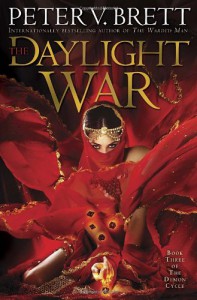 Adam of the Wertzone sums up my feelings pretty well in his review. This book was chock full of filler. No wonder Brett apparently needs five books for this series. Really, Daylight should have been cut in half and merged with book four. I have to say I'm not sure if I'm going to continue with the series or not.
Adam of the Wertzone sums up my feelings pretty well in his review. This book was chock full of filler. No wonder Brett apparently needs five books for this series. Really, Daylight should have been cut in half and merged with book four. I have to say I'm not sure if I'm going to continue with the series or not. I'm reluctantly giving this book three stars. Probably closer to two and a half. This would have been a much better book with a plot and some editing.
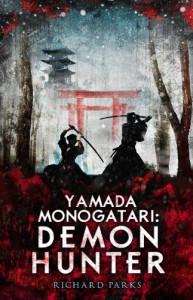 This book is a collection of short stories featuring an impoverished noble turned demon hunter in Heian Japan. The stories are separate but maintain continuity so the book is really a mosaic novel. These two points together remind me a lot of Andrzej Sapkowski's The Last Wish with a generous helping of Sherlock Holmes thrown in. There are some weaknesses, notably the stories are somewhat repetitious, the main character is a little too clever, and Parks overuses some supernatural elements, but I found the book fairly enjoyable.
This book is a collection of short stories featuring an impoverished noble turned demon hunter in Heian Japan. The stories are separate but maintain continuity so the book is really a mosaic novel. These two points together remind me a lot of Andrzej Sapkowski's The Last Wish with a generous helping of Sherlock Holmes thrown in. There are some weaknesses, notably the stories are somewhat repetitious, the main character is a little too clever, and Parks overuses some supernatural elements, but I found the book fairly enjoyable.
 Decent, but I wasn't blown away. The best part of the book was some strong characterization. Not every character got this, but most of them did. When the book was focused on this and not the bigger picture, I quite enjoyed it.
Decent, but I wasn't blown away. The best part of the book was some strong characterization. Not every character got this, but most of them did. When the book was focused on this and not the bigger picture, I quite enjoyed it.Despite the good stuff, I had some major reservations with some aspects of the world-building. First, I couldn't figure out exactly why the reeves were supposed to be so important, and so when things start to go wrong for them right off the bat, it didn't make any sense why it was a problem. The source of their authority is supposedly the Guardians, but even by the end of book we still don't know enough.
In particular however, I had a hard time believing the "rot/corruption" had spread over the Hundred for over twenty years, twenty years, and still no one has much of a frigging clue even when two armies suddenly show up out of nowhere. Are there no foot or horse messengers? (Finally mentioned towards the end.) Why does no one speak up when they have the chance? Is no one playing both sides against the middle? I think the real issue here is that it felt like these things were skipped over merely for the sake of the plot to create a false sense of drama.
It may not sound like I liked the book at all when I did. It's just hard to explain when there's a lot that doesn't make sense. A lot of people probably won't have the problems I did, but personally I can't give the book more than three stars. I will probably finish the trilogy since I already have the sequels. I won't put a high priority on it though.
 Like Kalpa Imperial, it's a mosaic novel of interconnected short stories. This time they're stories about a man who tells outrageous stories of his travels to other planets. Not really fiction, not really science fiction either so the book falls somewhere in between. Each story essentially has the same plot, but that never bothered me at all as it's so well written.
Like Kalpa Imperial, it's a mosaic novel of interconnected short stories. This time they're stories about a man who tells outrageous stories of his travels to other planets. Not really fiction, not really science fiction either so the book falls somewhere in between. Each story essentially has the same plot, but that never bothered me at all as it's so well written.
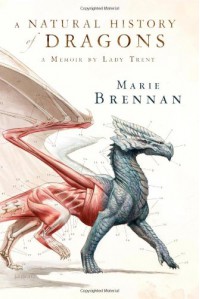 April of Bookspot Central and Dragon Ashes calls this book a fantasy of manners and the phrase is quite apt. Brennan evokes the society, conventions, and scientific knowledge of the Victorian era, an era not conducive to strong- and scientific-minded women. The book is written as a memoir detailing both the character's life and the results of her research.
April of Bookspot Central and Dragon Ashes calls this book a fantasy of manners and the phrase is quite apt. Brennan evokes the society, conventions, and scientific knowledge of the Victorian era, an era not conducive to strong- and scientific-minded women. The book is written as a memoir detailing both the character's life and the results of her research.There's a lot to like about this book. The book and characters are well written. Those who don't mind a different style of format or plot will enjoy this. An extra benefit is interior artwork that livens up the reading experience.
The book's drawbacks are fairly minor. Like a 19th Century treatise, the memoir is a little dry, a little too linear, so the story might have been stronger with some more personal feeling by the narrator. Also, towards the end, the plot becomes a little too much like an Indiana Jones-style caper.
There was also little of dragons in this book actually, but the preface reveals that it's the first of a series so perhaps that's to be expected.
A Natural History of Dragons was a very solid and enjoyable book and I plan to pick up the next one in the series.
 I quite enjoyed this one, though I have to admit I was surprised at how fantastical it was for a regular fiction book. I mean, it's got flying horses and people skipping through time. Once you accept that, it's a very good book, very heavy on romanticism, idealism, and spiritualism. Plot is also a little loose, but the beautiful, evocative prose keeps you turning the pages.
I quite enjoyed this one, though I have to admit I was surprised at how fantastical it was for a regular fiction book. I mean, it's got flying horses and people skipping through time. Once you accept that, it's a very good book, very heavy on romanticism, idealism, and spiritualism. Plot is also a little loose, but the beautiful, evocative prose keeps you turning the pages. One thing that did bother me:
When Abby falls sick and the doctors tell them she's going to die, Hardesty runs off. I understand why he did it and it ultimately works because that's they way the plot was going. But personally I don't think I could ever forgive a man who leaves his daughter to die.
 I read this one for the WWE Women in Genre challenge and now rather wish I hadn't. Grimspace reminds me a lot of the now ubiquitous urban fantasy/paranormal romance one finds on bookstore shelves these days, but in a sci-fi setting. The book is chock-full of the cliches in that genre. The writing is quite weak, pacing is off, and there are plot holes all over the place that are big enough to fly spaceship through.
I read this one for the WWE Women in Genre challenge and now rather wish I hadn't. Grimspace reminds me a lot of the now ubiquitous urban fantasy/paranormal romance one finds on bookstore shelves these days, but in a sci-fi setting. The book is chock-full of the cliches in that genre. The writing is quite weak, pacing is off, and there are plot holes all over the place that are big enough to fly spaceship through. I give this book two starts because there are flashes of good writing and I know there are people who would enjoy this book. I just wasn't one of them.
 This one is a historical fantasy set in 12th Century Japan. It has two intertwined stories, one of an aging princess, Harueme, and the other of the story the princess is writing about a cat that turns into a woman. There are a lot of parallels between the two stories and you get the sense that Harueme is writing as much as for herself as for anyone else. The writing is great. You really get a sense of the place and the characters. Very good and strongly recommended.
This one is a historical fantasy set in 12th Century Japan. It has two intertwined stories, one of an aging princess, Harueme, and the other of the story the princess is writing about a cat that turns into a woman. There are a lot of parallels between the two stories and you get the sense that Harueme is writing as much as for herself as for anyone else. The writing is great. You really get a sense of the place and the characters. Very good and strongly recommended.
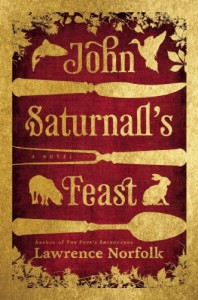 It's not a fantastic book, but I enjoyed it a bit. It follows much of the life of John Saturnall from being cast out of his village with his mother for witchcraft to rising to Master Cook of a noble household. All set to the backdrop of the English Civil War between Charles I and Parliament. The plot and characterization are often simplistic and the author never really follows through on some ideas.
It's not a fantastic book, but I enjoyed it a bit. It follows much of the life of John Saturnall from being cast out of his village with his mother for witchcraft to rising to Master Cook of a noble household. All set to the backdrop of the English Civil War between Charles I and Parliament. The plot and characterization are often simplistic and the author never really follows through on some ideas. On the other hand I thought Norfolk was quite restrained with certain aspects of the story such as the political background. The Civil War, religious fanaticism, even the romance are more sub-plots that have an impact on the main character's life. The major focus is on the character being a cook. Here the author is restrained as well so the reader doesn't get overwhelmed with recipes and the like so you don't need to be a food aficionado to enjoy it.
To take inspiration from the title, the best way to read this book is to sit back and enjoy the feast.
 This one starts off simply enough as a noir detective story with a private investigator hired to find the creator of the fictional character, Osama Bin Laden. However, those looking for a quick, mystery plot will be disappointed as the story quickly becomes a surreal journey as the main character struggles to understand how this fictional world, which is really our world, a world of terrorists, suicide bombers, and other things, can possibly exist. There are even suggestions that our world and the world of the novel are far more intertwined that we think. Not a book for everyone, but one worth checking out.
This one starts off simply enough as a noir detective story with a private investigator hired to find the creator of the fictional character, Osama Bin Laden. However, those looking for a quick, mystery plot will be disappointed as the story quickly becomes a surreal journey as the main character struggles to understand how this fictional world, which is really our world, a world of terrorists, suicide bombers, and other things, can possibly exist. There are even suggestions that our world and the world of the novel are far more intertwined that we think. Not a book for everyone, but one worth checking out. Being written on the tenth anniversary of 9/11, Osama can also be considered a tribute to the victims of that terrible day.
 I must be the only who didn't love this book to death...
I must be the only who didn't love this book to death... Cold Days was quite good and I liked learning more about the Outsiders, Winter/Summer's roles, etc. But that being said, after the "oomph" of the last two books, the story felt way too much like a typical Dresden plot.
Also, I felt that all of Harry's old friends got over him being alive again way too easily. Granted, it had been several months since he "died", but almost everyone accepted him being back without batting an eye. Especially after Ghost Story. They may have had doubts about his personality or loyalty, but they didn't seem to have any problem with him coming back from the dead. I'm getting a little of the recent trend in fantasy to treat death like it's no big deal.
I enjoyed the book, but it felt like Butcher was trying too hard to get things back to normal.
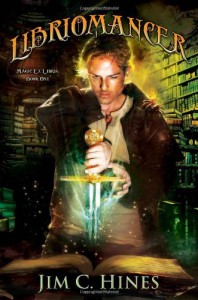 Decent UF-ish book. First book I've read by Hines and I liked it for the most part. Characters are fairly decent and the magic system is very intriguing. I did feel however that the magic was a little powerful. I tend to lean toward magic having limitations. It was an fast, enjoyable read and would recommend it to fans of the Dresden Files.
Decent UF-ish book. First book I've read by Hines and I liked it for the most part. Characters are fairly decent and the magic system is very intriguing. I did feel however that the magic was a little powerful. I tend to lean toward magic having limitations. It was an fast, enjoyable read and would recommend it to fans of the Dresden Files.
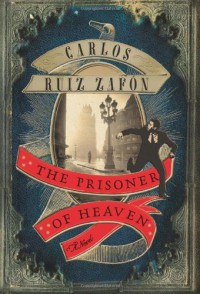 The Prisoner of Heaven is a good sequel to The Shadow of the Wind and The Angel's Game. Prisoner is the shortest book so far in the loosely connected quartet, and gives quite a bit of background on Fermin. It is very much a sequel book, tying the two previous books together into a larger narrative, while also setting up the story for the next book. The main drawback is that the book cannot stand on it's own. You wouldn't read this without reading either Shadow or Angel's Game.
The Prisoner of Heaven is a good sequel to The Shadow of the Wind and The Angel's Game. Prisoner is the shortest book so far in the loosely connected quartet, and gives quite a bit of background on Fermin. It is very much a sequel book, tying the two previous books together into a larger narrative, while also setting up the story for the next book. The main drawback is that the book cannot stand on it's own. You wouldn't read this without reading either Shadow or Angel's Game.


